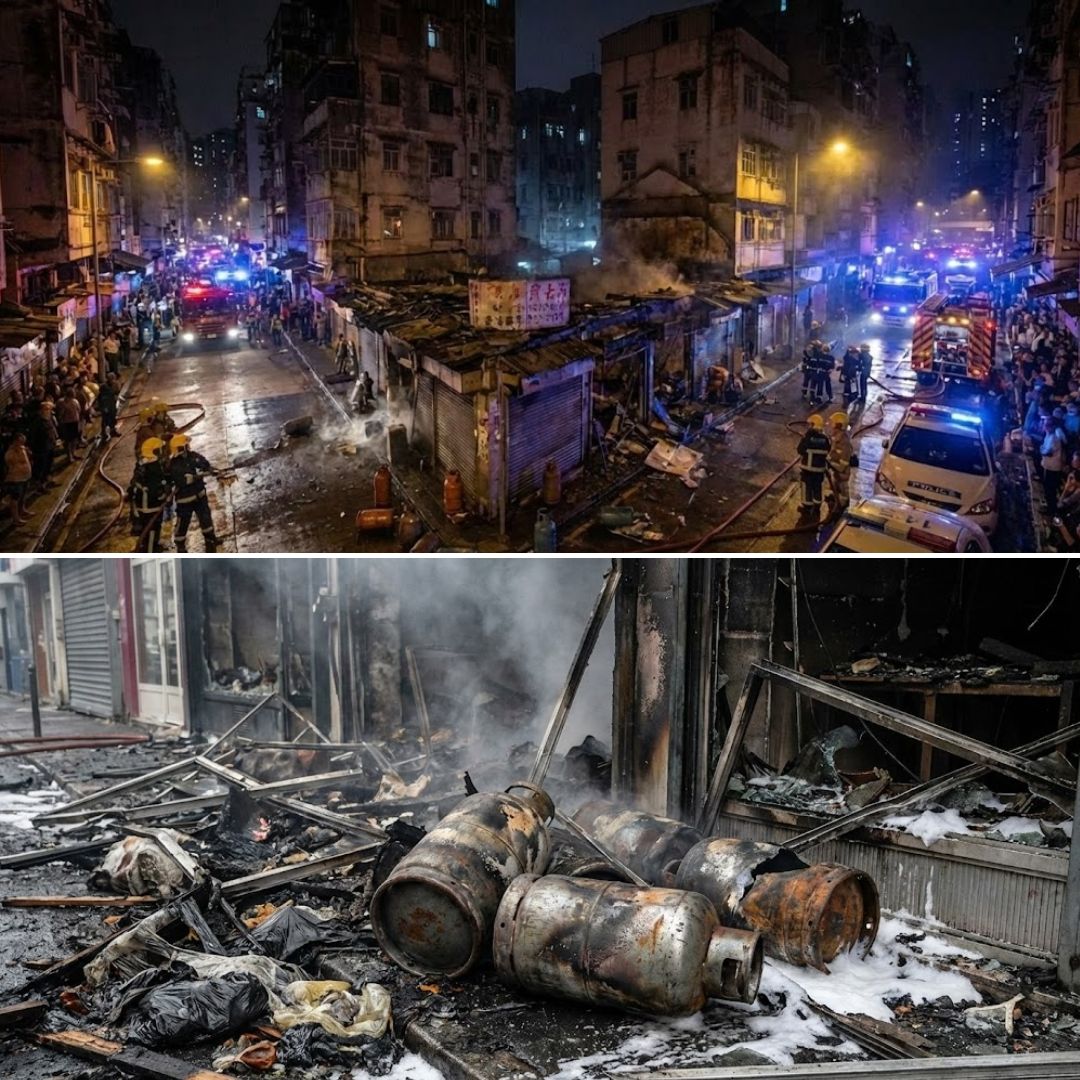A major fire erupted around 10 p.m. on November 27 on Linga Gudi Road in Vijayapura city, Karnataka, triggered by a discarded cigarette at a food centre, leading to gas cylinder explosions, according to Zee News. The blaze spread to seven shops, including a tea shop and pawn shop, reducing them to ashes and damaging a nearby house, while firefighters narrowly escaped injury from a mid-operation blast.
No casualties reported; the brigade salvaged five cylinders to prevent greater disaster, with investigations ongoing per recent updates.
Fire’s Rapid Spread and Heroic Response
The incident began when a carelessly discarded cigarette ignited flammable materials at the food centre, quickly engulfing neighbouring stalls in flames. Gas cylinders stored in the food centre and tea shop detonated, accelerating the destruction and turning the area into an inferno that consumed seven shops entirely.
Fire brigade personnel arrived promptly but faced a dramatic explosion during suppression efforts, one cylinder burst as they worked, forcing a hasty retreat yet showcasing their bravery in evacuating the zone. A senior official highlighted their success: the team removed five additional cylinders, averting what could have been a catastrophic chain reaction. This swift action limited the damage to property, sparing lives in a densely packed commercial street.
Underlying Causes and Local Vulnerabilities
Vijayapura’s Linga Gudi Road exemplifies risks in crowded markets where shops cluster without adequate spacing or safety buffers. Recent reports confirm no prior warnings on this site, but the cigarette spark underscores common negligence amid lax enforcement of fire codes.
Local authorities have pledged audits to inspect gas storage and educate vendors, drawing from similar past blazes in Karnataka’s urban clusters. Residents now face rebuilding challenges, with shop owners mourning livelihoods tied to these small enterprises. Enhanced vigilance could transform such tragedies into preventable mishaps.
Broader Implications for Safety
This event spotlights systemic gaps in fire preparedness across India’s bustling locales, where domestic and commercial gas use surges without proportional safeguards. While no injuries occurred, the near-miss for firefighters reveals human costs behind headlines.
Officials’ commitment to probes offers hope, yet proactive measures, like mandatory extinguishers and no-smoking zones, remain essential. Community leaders emphasise dialogue on shared responsibility to shield vulnerable neighbourhoods from recurring threats.
Fire Incidents and Safety
Fire incidents caused by gas cylinder explosions often result from hazardous practices such as improper storage, poor ventilation, faulty equipment, or careless handling. To prevent such disasters, it is crucial to store gas cylinders upright in well-ventilated, shaded areas away from direct heat or sunlight.
Regular inspection for leaks using simple methods like applying soapy water to connections can help detect gas escapes early. Only use certified pressure regulators and hoses, and replace them as recommended by manufacturers. Never tamper with safety valves or overfill cylinders. In case of gas smell or suspected leaks, immediately turn off the cylinder valve, ventilate the area, avoid ignition sources like lighters or switches, and evacuate safely before calling emergency services.
Taking swift and informed precautions dramatically reduces fire risks, safeguarding lives and property in both homes and commercial settings. Fire safety education and compliance must be community priorities to avoid tragedies like the recent Vijayapura fire
The Logical Indian’s Perspective
Such fires erode community fabric, yet they ignite calls for unity through empathy and action. The Logical Indian champions stricter regulations, public awareness drives, and support for affected families to nurture harmony and resilience. Prioritising kindness in daily habits, discarding cigarettes responsibly, fosters coexistence.












